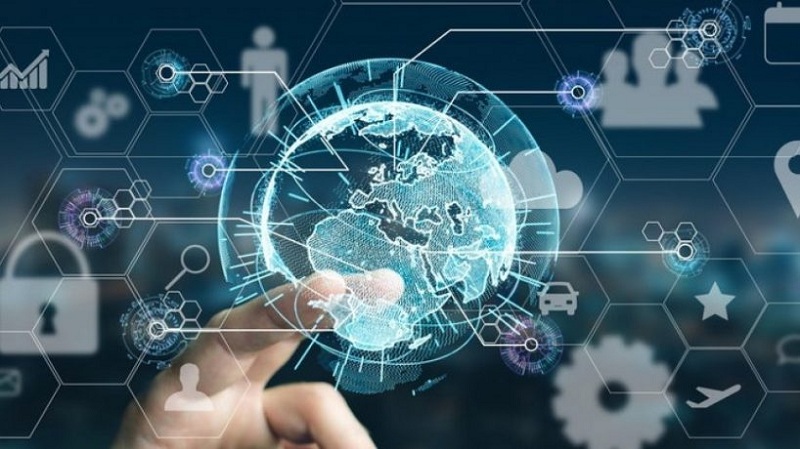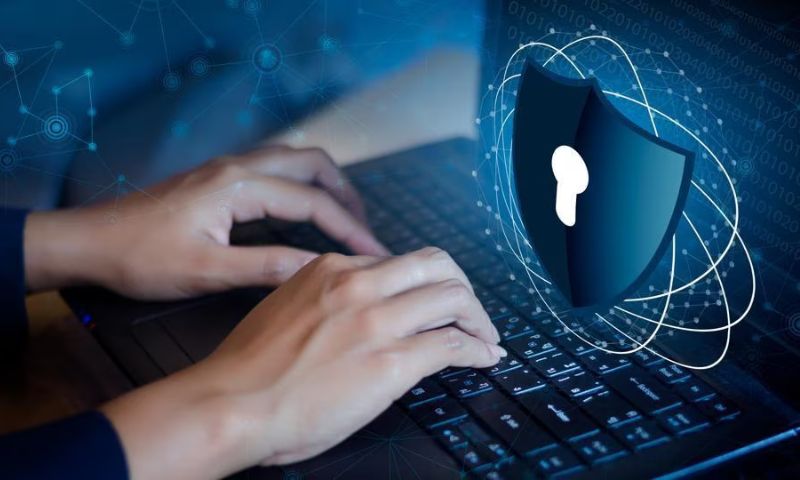Let’s dive into the future of digital economic platforms. These are not just trends; they’re the building blocks of a new era. Think about shopping, selling, or offering a service; now picture doing it with the smartest, safest tools around. Our journey will take us through the power of blockchain for rock-solid security and personalized shopping with the magic of AI. We’ll explore how cryptocurrencies and high-tech financial tools are changing money moves online and see how gig workers get ahead with cutting-edge tech. Underpinning all this is the big deal of cross-border deals. Get ready to see how tomorrow’s trade gears up for greatness!
Embracing Blockchain and AI for Advanced Marketplace Efficiency
Integrating Blockchain for Enhanced Security and Trust
When we shop online, we want to feel safe. That’s where blockchain comes in. This tech acts like an unbreakable digital record. It stores data in blocks. Think of it like chapters in a book nobody can rewrite. For economic platforms, this means more trust. Why? Because no one can change details once added. It keeps every deal clean and clear.
Using blockchain, online marketplaces grow safer. It stops fraud and builds trust. Seller and buyer both know they’re secure. Picture buying a watch online. The site uses blockchain. The seller can’t lie about the watch. And you know you’ll get what you pay for. This means more people are happy to shop and sell.
Blockchain also makes digital trade platforms strong. They handle deals across the globe without worry. No fear of someone messing with your info. Think of all the new businesses this could start. More people will jump into the digital economy. It breaks down old barriers. We link up, buying and selling with anyone, anytime, on trust.
The Role of AI in Personalizing User Experience
Now, let’s talk about AI, or artificial intelligence. AI helps us by studying our choices. It learns what we like and shows us more of it. This is a big deal for online shops. They use AI to make your shopping cooler and faster. You get options that fit what you want. It makes online shopping feel like the store knows you.
AI powers digital marketplaces to be more of what we need. It looks at what we buy and searches for patterns. It might notice you buy lots of sci-fi books. Then, it suggests new ones you might like. Or it sees you’ve been looking for a bike. It shows you bikes that fit what you want. This feels great because it’s just for you. You save time and find cool new stuff.
Peer-to-peer networks gain from AI, too. These networks are like a big web of friends trading things. AI makes it smarter. Say you’re a graphic designer on a gig platform. AI can match you with people who need your skills. It’s like having a super-smart buddy who knows just what you want.
In all this, we see digital economy trends moving fast. We find new ways to make tech work for us. Blockchain gives us trust and safety in buying and selling. AI gives us shopping that fits just right. Together, they change how we think about the marketplace. It doesn’t just grow; it gets better for you and me.
Each time we log in to buy or sell, we’re part of this change. It’s a world where deals happen with a click or tap. Where things get easier and safer every day. And best of all, it feels like it’s all made just for us. That’s the future of the digital economy. It’s not just happening — we’re building it with every click.

The Rise of Cryptocurrencies and Financial Technologies in E-Commerce
Facilitating Seamless Transactions with Cryptocurrencies
Buying stuff online gets easier every day. The big game changer? Cryptocurrency. It’s like money, but all digital and moves quick with no hitches. Imagine clicking “buy,” and it’s paid in a snap. No counting coins or waiting on bank approvals. This magic money travels the world without getting stopped at borders, which means you can buy a gadget from halfway across the globe as easy as buying a doughnut from your local shop.
But how do we make sure no one is fibbing about what they’re selling or how much you’re paying? Enter blockchain. This smart tech acts like a giant, unbreakable ledger. It records every deal so no one can cheat. Picture it as a giant puzzle. Once a piece fits in, it can’t be moved. That builds trust, and in the world of online shopping, trust is king. Cryptocurrencies use blockchain to keep transactions honest and clear.
Advancements in Financial Technologies and Their Impact on Trade
Let’s talk about the smart stuff behind the scenes. Financial technology, or “fintech” for short, is a big deal in trade. It’s like giving your piggy bank a brain. These smart systems figure out risks, manage money, and can sometimes predict if a product will sell like hotcakes or not.
AI, short for artificial intelligence, rocks the fintech world by learning what buyers like. It peeks at your shopping history and says, “Hey, you might like this too!” That’s not magic; it’s machine learning, which is a part of AI. Imagine a robot that learns how to make your sandwich just the way you like, with less mustard each time—that’s machine learning—but for your shopping.
All this nifty technology means businesses can sell more and buyers can find what they want quicker. Plus, it’s all wrapped up in tough-as-nails security, so your money and data stay safe. That’s a big deal when you’re shopping on your phone or computer. And guess what? These tech wonders only get better over time.
They’re always learning, so every click, swipe, and purchase you make teaches them how to serve you better. The fancier these systems get, the easier your online shopping ride will be. So, the next time you’re online eyeing that cool new toy or a slick pair of shoes, know that a bunch of clever tech is working hard to make your buy smooth and safe. And that’s a peek into the future where money moves like lightning, and buying goodies online feels like a breeze.

Optimizing Gig Economy Platforms with Peer-to-Peer Innovations
Enhancing Gig Economy Platforms through Machine Learning
The gig economy is changing the way we work. And it’s huge! Think of it like lots of short-term jobs or gigs. But, how do we make it better for everyone? Let’s talk machine learning. This tech can match the right job with the right person fast. Plus, it helps set fair prices. This is good for gig workers to find work and earn what they should.
It’s like a matchmaker in the digital world. Machine learning sees what jobs are out there. Then, it checks who can do that job well. After that, it joins them together. It’s smart and gets smarter with each gig. The more it learns, the better it gets at finding the best gigs for people. It’s not magic; it’s machine learning!
The Growth of Decentralized and Peer-to-Peer Networks
Now, let’s dive into decentralized networks. They are like spider webs. No single spider is in charge. Instead, lots of spiders work together to make a big web. Here, the spiders are computers or people. They’re all over the world, working together, without someone bossing them around. This means more power for everyday folks. We call this peer-to-peer, or P2P for short.
The cool thing about P2P is you don’t need a big company in the middle. People can talk, trade, or work directly with each other. It’s faster and often cheaper. Plus, it’s hard for someone to mess with the system. This is good for keeping things fair and safe.
And remember how we talked about machine learning? Guess what – it can make P2P networks even better. It can help figure out who to trust in the network. It can help us find the best deals too. So, we get the things we need from people we can trust, all thanks to this amazing tech.
In the future, we’ll see even more P2P action. Smart contracts come into play too. Picture this: You do a gig, and the payment comes right after, no waiting. That’s what smart contracts can do. They’re like deals that keep themselves. Finish the job, and the tech makes sure you get paid.
All this is just the start. As we get new tech and ideas, P2P networks will grow. They’ll help the gig economy become an even bigger deal. And they’ll help us all trade and work together in smarter ways. That’s how we make a better future for everyone in the gig world.

Transformative Strategies for Cross-Border Digital Transactions
Leveraging Big Data for Strategic E-Commerce Automation
Big data is key to e-commerce success today. It helps us spot trends and make smart moves. We use it to see what customers like. This lets us show them items they might buy. It’s like having a map that leads to treasure!
We gather tons of info every time someone shops online. This data tells us what, how, and when people buy. We use this info to make shopping easy and fun for everyone. Smart computer programs help too. They learn from the data to make better guesses about what people want next.
But lots of data can be hard to handle. We must be careful to keep it safe from hackers. If we use it right, we can create a shopping world that knows what you want before you do!
Prioritizing Cybersecurity and Data Privacy in a Digital Economy
In our online world, keeping info safe is super important. People worry about their private stuff getting stolen. And they should! Bad guys are always trying to break into our digital space.
That’s why we work hard to protect your data. Think of it like building a fortress around your secrets. We use stuff like encryption. It’s a way to scramble your info so only the right person can read it.
We also teach everyone about keeping safe online. You have to be smart, like not sharing your passwords. And we have rules to follow that make sure businesses keep your info private.
Cybersecurity isn’t just about keeping out the bad guys. It’s about making sure you feel safe shopping and sharing online. It’s a big deal, and we’ve got your back!
Big data and cybersecurity go hand-in-hand. They make online shopping rock! When we use big data right and keep things safe, you get a super cool shopping experience. It’s like having your own personal shopper in your pocket all the time!
We’ve talked a lot in this post. First, we looked at how blockchain makes markets safer and builds trust. We also saw how AI makes shopping more personal for you. Then, we checked out how digital money and new tech are changing online shopping. They make buying and selling smooth and fast.
We didn’t stop there. We explored the gig world too, where smart machines help you get better gigs, and new networks let you work with people all over. Last, we talked about how big data helps with selling across borders, and why we must keep our online info safe.
I think using technology like blockchain, AI, and digital cash can really make trading better for us all. Let’s keep our eyes open for these changes and use them to make buying, selling, and working online super smart and safe. Stay ahead and make the most of these cool tools!
Q&A :
What is the forecast for the growth of digital economic platforms?
The future of digital economic platforms is promising, and they are expected to experience substantial growth. As businesses and consumers increasingly adopt digital transactions, marketplaces, and services, these platforms are becoming more pivotal to economic activities. The integration of advanced technologies like artificial intelligence, blockchain, and big data analytics positions them as essential drivers of efficiency, scalability, and personalized experiences.
How will emerging technologies shape the future of digital economic platforms?
Emerging technologies are poised to significantly shape the future of digital economic platforms by enhancing the way they operate and the value they deliver. Artificial Intelligence (AI) can automate complex processes and provide predictive analytics, while blockchain technology offers secure and transparent transactions. Additionally, Internet of Things (IoT) integration can facilitate more interconnected and responsive platforms, leading to new business models and revenue opportunities.
What role will regulation play in the evolution of digital economic platforms?
Regulation will play a critical role in the evolution of digital economic platforms. As these platforms become more ingrained in the global economy, governments and regulatory bodies are likely to develop new frameworks to ensure consumer protection, fair competition, and data privacy. These regulations could shape platform functionalities, operational practices, and even influence the types of services offered, ensuring a healthy and secure digital economy.
Can digital economic platforms drive sustainable economic growth?
Digital economic platforms have the potential to drive sustainable economic growth by creating new market opportunities and enabling a more efficient allocation of resources. They can reduce barriers to entry for small businesses and individual entrepreneurs, stimulate innovation, and promote more inclusive economic participation. However, to achieve sustainability, these platforms must incorporate practices that support environmental, social, and governance (ESG) criteria.
What challenges could digital economic platforms face in the future?
The future of digital economic platforms is not without challenges. They may encounter issues related to data security breaches, privacy concerns, and the digital divide that could limit access for certain populations. Additionally, the disruption of traditional industries could have socioeconomic implications, including job displacement. Platform providers will need to address these concerns proactively to ensure their longevity and societal acceptance.



